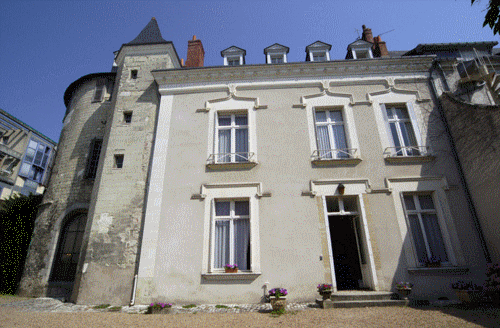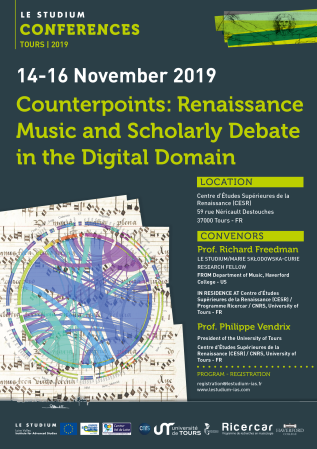Counterpoints: Renaissance Music and Scholarly Debate in the Digital Domain
Centre d’Études Supérieures de la Renaissance (CESR)
59 rue Néricault Destouches
37000 Tours
France
Presentation
The conference will start at 16:30 on Thursday 14th and will end at noon on Saturday 16th November.
CRIM builds upon recent developments in the digital domain for music scholarship, implementing a new kind of quotable text for music, using XML encodings of musical scores (based on the open-source Music Encoding Initiative standard), along with a robust digital platform for managing citations, claims, and counter-claims in a collaborative environment. Indeed, thanks to the efforts of an international team of musicologists and digital scholarship specialists, we have already compiled a dabatase of over thousands of relationships among Masses and their models. In this workshop-conference we will turn from the assembly of data to its interpretation, via presentations by small teams of scholars and researchers, as well as discussions focused around particular aspects of the project.
Key questions to be addressed include:
How did compositional practice change over the course of the sixteenth century, particularly as composers returned to adapt and redeploy earlier compositions in new guises and contexts? How can the Imitation Mass help us to tell that story in new and persuasive ways?
What connections can we draw between sixteenth-century statements on compositional practice and the various patterns that we can observe today? What new lines of transformation should we recognize in light of contemporary understandings of musical structure?
What relationship does the process of musical adaptation and modelling bear to the wider humanist concern for imitatio of classical models? Did sixteenth-century thinkers analogize music in this way? Can we use the Imitation Mass to learn how composers of the period competed with each other for prestige?
How do the processes of adaptation heard in our corpus compare with those of other musical periods?
How might the digital domain inaugurate new modes of collaborative research and scholarly communication?
Convenors
- Prof. Richard Freedman, LE STUDIUM / Marie Skłodowska-Curie Research Fellowship
FROM Department of Music, Haverford College - US
IN RESIDENCE AT CESR (Centre d’Études Supérieures de la Renaissance) / Programme Ricercar / CNRS, University of Tours - FR - Prof. Philippe Vendrix, President of the University of Tours
CESR (Centre d’Études Supérieures de la Renaissance) / CNRS, University of Tours - FR
Slideshow

Location

The conference venue is unique. Located right next to the basilica of St Martin in the old city centre of Tours, the Centre d'Études Supérieures de la Renaissance (Centre for Advanced Studies in the Renaissance) is a teaching and research institution which welcomes students and researchers seeking initial or supplementary instruction in all aspects of the Renaissance. The Centre was initially constituted in 1956 on the basis of a library and a documentary archive, supplemented by a collection of photographs and databases. It is now a venue for multi-disciplinary instruction, which, in association with the various Faculties of the University, has responsibility for teaching and research in History, History of Art, Literature, Languages, Musicology, and Philosophy. It currently leads a large research programme dedicated to the cultural regional heritage (Intelligence des Patrimoines). As a research centre it brings together fifty or so researchers committed to the investigation of the "civilization of the Renaissance" from Petrarch to Descartes. Participants will be welcomed in this exceptional surrounding blending Middle Age and Renaissance cultures and will have the opportunity to discover French cuisine and wines.









